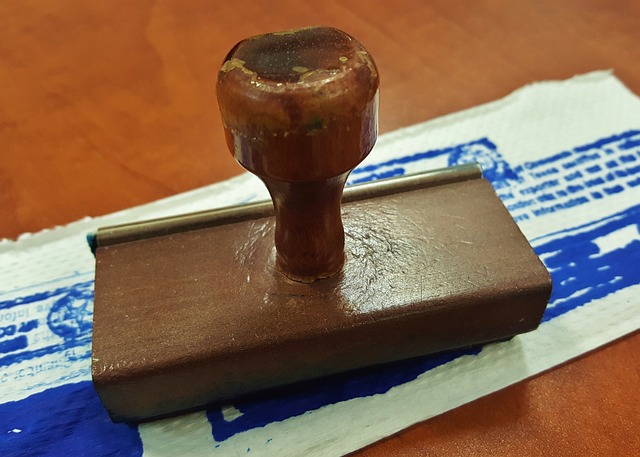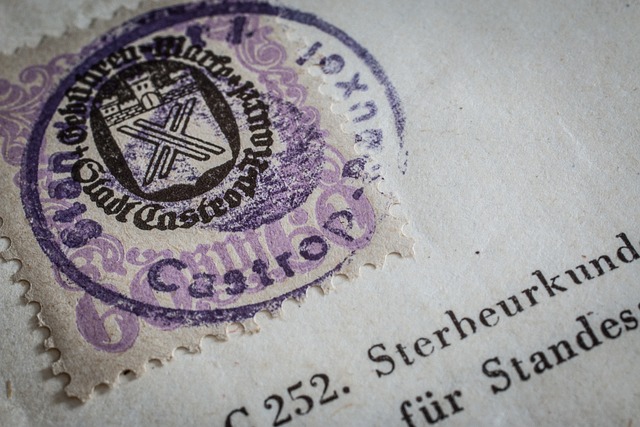In the United Kingdom, where precise and legal translations are paramount for both personal and professional matters, notarised translation services UK are essential. These services meticulously translate foreign language documents into English, ensuring that every detail is accurate and legally sound. A certified translator first confirms the translation's exactness, after which a Notary Public endorses it with a notarisation stamp, making the document legally recognisable within UK jurisdictions. This two-step verification process is crucial for legal documents of all kinds, from business agreements to personal records like birth certificates, and is critical in immigration processes and international legal matters, ensuring that the translated content meets the high standards required by UK law. Notarised translation services UK are a cornerstone of the legal system, facilitating clear and compliant communication across linguistic barriers and fostering trust and reliability in cross-border transactions and interactions.
navigating the legal landscape of the United Kingdom necessitates a keen understanding of documentation requirements. When legal documents require translation, the integrity and authenticity of such translations become paramount. This article delves into the indispensable role of professional notarised translation services in the UK legal context, elucidating their critical function and the intricacies that differentiate them from certified translations. We will guide you through identifying reputable service providers, understanding the legal validity of these translations, and providing a comprehensive step-by-step process for obtaining notarised translations for your legal needs in the UK. With case studies illustrating their practical application, this article is an essential resource for anyone involved in UK legal proceedings where language barriers exist.
- Understanding the Necessity of Notarised Translation Services in the UK Legal Context
- The Role of a Notarised Translation in UK Legal Proceedings
- Key Differences Between Certified and Notarised Translations in the UK
- Identifying Credible Notarised Translation Providers in the UK
- Step-by-Step Guide to Obtaining a Notarised Translation for Legal Use in the UK
- Common Types of Documents Requiring Notarisation for Legal Purposes in the UK
- The Legal Validity and Recognition of Notarised Translations in the UK
- Ensuring Accuracy: The Process of Notarising Translations by Professional Linguists in the UK
- Case Studies: How Notarised Translations Have Facilitated Legal Matters in the UK
Understanding the Necessity of Notarised Translation Services in the UK Legal Context

When legal documents require translation in the UK, accuracy and official recognition are paramount. This is where notarised translation services UK play a crucial role. The legal system in the UK demands that foreign documents be notarised to ensure their authenticity and to make them legally enforceable within the jurisdiction. A notarised translation service in the UK provides certified translations, verified by a qualified translator and then endorsed by a UK-registered notary public. This dual certification confirms that the translated content is an accurate representation of the original document, adhering to both the linguistic nuances and the legal standards required in UK legal proceedings. The notary’s stamp of approval, along with the translator’s professional credentials, instils trust and legality in the translation, making it acceptable for use in court, by government bodies, or in any official context within the UK. This meticulous process ensures that individuals and organisations can navigate legal matters without the complications that arise from language barriers, thereby facilitating smoother and more reliable legal transactions across diverse linguistic backgrounds.
The Role of a Notarised Translation in UK Legal Proceedings

In the context of UK legal proceedings, a notarised translation plays an indispensable role for parties involved who require documentation to be presented in English or another language. Legal documents such as contracts, certificates, and other official papers must accurately reflect their content in the required language to be legally recognised and enforceable. Notarised translation services UK are specialized in this area, providing certified translations that comply with the strict legal standards set by the UK’s jurisdictions. These translations are not only an exact linguistic transfer of the original text but also come with a notarial certificate that attests to the accuracy and authenticity of the translation. This certification is crucial as it confirms the identity of both the translator and the person signing the document, ensuring that the translated legal documents hold the same weight and validity as their original counterparts. Engaging with professional notarised translation services UK ensures compliance with legal requirements, facilitating smoother proceedings in courts or regulatory bodies within the UK.
The integrity and reliability of notarised translations are paramount in legal settings, where any discrepancy could lead to complications or even invalidate legal documents altogether. Notarised translation services UK adhere to a rigorous process that involves a certified translator’s skilled interpretation, followed by a notary public who verifies the translator’s qualifications and the translation’s accuracy. This two-step verification process is essential for legal entities both within the UK and when dealing with international law. It is a testament to the meticulous standards required that these services are accredited by relevant authorities, providing clients with peace of mind that their documents will be accepted and respected in legal contexts across the UK.
Key Differences Between Certified and Notarised Translations in the UK

When navigating the realm of legal documentation in the UK, it’s crucial to understand the nuances between certified and notarised translations. Both serve as official translations, but they are distinct in their application and acceptance. Notarised translation services UK hold a special significance in this context, as they provide translations that have been authenticated by a public notary. A notarised translation includes a formal declaration from the translator attesting to the accuracy of the translation and the use of competent translation techniques. This declaration is then notarised by a notary public, who verifies the identity of both the translator and the person signing the document, thus ensuring the authenticity of the translated content.
In contrast, certified translations are official translations that have been reviewed and stamped by an officially recognised body or translator. Unlike notarised translations, they do not necessarily involve a notary public. Instead, they are often sufficient for administrative processes within the UK, such as visa applications or university enrolment. The acceptance of certified translations is contingent upon the authority overseeing their use, which may require a specific type of certification or stamp to deem them valid. For legal purposes where international treaties are involved, such as those under the EU, a notarised translation might be required to ensure its recognition across different jurisdictions. Therefore, when determining between certified and notarised translations for UK legal use, it is imperative to consider the specific requirements of the institution or government department that will utilise the document to ascertain which type of translation service from the UK is necessary.
Identifying Credible Notarised Translation Providers in the UK

When engaging with legal documents that require translation in the UK, the integrity and authenticity of the translated content are paramount. Notarised translation services UK play a critical role in ensuring that translations are accurate and legally binding. To identify credible providers of notarised translation services within the UK, one must look for several key indicators of professionalism and reliability. Firstly, verify that the translation service is registered with, or accredited by, relevant professional bodies such as the Institute of Translation and Interpreting (ITI) or the Chartered Institute of Linguists (CIOL). These organisations uphold high standards of quality and ethics within the industry. Additionally, check if the translators are individually registered with the UK’s Professional Register for Translators and Interpreters, a compulsory register for translation professionals who wish to work in certain legal contexts. This registration confirms that the translator has the necessary qualifications and professional indemnity insurance to perform notarised translations. Moreover, ensure that the translation service provides a clear process for notarisation, which typically involves a qualified solicitor or notary public certifying the accuracy and authenticity of the translation. This certification is essential for the translation to be accepted by UK legal entities and institutions. By adhering to these criteria, individuals can confidently select a reputable notarised translation service UK that meets all legal requirements and ensures the translation’s integrity in a legal context.
Step-by-Step Guide to Obtaining a Notarised Translation for Legal Use in the UK

When engaging with legal documents in the UK, precision and authenticity are paramount. A notarised translation is an official translation that has been certified by a Notary Public to ensure its accuracy and reliability. For non-English legal documents, this process is indispensable for both personal and business dealings within the UK’s legal system. To obtain a notarised translation, follow these steps:
Initially, identify the document that requires translation and ascertain whether it falls under legal categories. Once confirmed, locate a reputable notarised translation service provider in the UK. These services are staffed by professional translators who are adept at translating into and from English while maintaining the original meaning and context. They also understand the legal nuances required for official documents.
After selecting your translation service, you will need to provide the original document along with any necessary identification to verify your identity. The translator will then translate the content, word for word, ensuring that every detail is accurately conveyed. Upon completion, the translation is reviewed and stamped by a qualified Notary Public. This notarisation certifies that the translated content is a true and accurate representation of the original document. Finally, the translated document should be submitted along with proof of the translator’s qualifications to the relevant UK authority or legal entity, as required. By adhering to these steps and utilizing professional notarised translation services UK, you can ensure that your legal documents are accurately represented in English, meeting all necessary legal requirements for use within the UK jurisdiction.
Common Types of Documents Requiring Notarisation for Legal Purposes in the UK

When engaging with legal matters within the UK, it is imperative that all foreign documents are properly authenticated to be recognised by British courts and institutions. Notarised translation services UK play a crucial role in this process, ensuring that translations of documents from various languages into English are both accurate and legally valid. Common types of documents requiring notarisation include official certificates such as academic transcripts, birth, marriage, and death certificates. These documents often form the basis of legal proceedings or processes like immigration, where the authenticity of an individual’s personal history must be verified. Additionally, commercial agreements, contracts, and corporate documents that are used in the UK but originated from abroad also necessitate notarisation to be legally binding. This process verifies the document’s original language and confirms its authenticity, providing assurance that it meets the legal standards set forth by UK law. Notarised translation services UK are adept at handling such documents, ensuring they comply with the Legalization Act 1987 and the Apostille Convention where applicable. This meticulous process underpins the integrity of international interactions within the UK’s legal system, facilitating trust and compliance in a globalised world.
The Legal Validity and Recognition of Notarised Translations in the UK

When engaging with legal matters within the UK, the accuracy and legitimacy of documents are paramount. In such instances, a notarised translation is indispensable for foreign language documents to be recognised by British legal entities. Notarised translation services UK play a critical role in ensuring that translations are both precise and valid for use in legal proceedings. These services involve a certified translator confirming the translation’s accuracy and authenticity before a notary public, who then notarises the document. This dual verification process underscores the integrity of the translated content, making it legally binding and acceptable across various UK jurisdictions. The Foreign and Commonwealth Office (FCO) provides a list of approved translators and translation companies that offer notarised translation services UK, ensuring that legal documents from international individuals or businesses are properly understood by UK authorities. This recognition is essential for the seamless operation of international trade, immigration processes, and cross-border legal activities, thereby facilitating justice and commerce without language barriers.
Ensuring Accuracy: The Process of Notarising Translations by Professional Linguists in the UK

In the United Kingdom, where legal documentation is a cornerstone of both private and public life, the accuracy and reliability of translations are paramount. When legal matters span across language barriers, professional notarised translation services UK become indispensable. These services ensure that translations are not only linguistically precise but also legally accurate. The process begins with the selection of professional linguists who possess both a deep understanding of the source and target languages and a thorough knowledge of legal terminology. These experts translate documents, from contracts to witness statements, with an attention to detail that is critical in legal contexts. Upon completion, the translations undergo a meticulous review by a second linguist to identify any discrepancies or nuances that may affect the legality and enforceability of the translated content. This collaborative approach to translation fosters trust and reliability among clients who require notarised documents for use in UK legal proceedings. Once validated, the translations are then notarised by a qualified and impartial notary public, who verifies the identity of the translator and confirms that the translation is complete and accurate to the best of their knowledge and belief. This official stamp of approval certifies that the translated document can be used in legal settings with the same authority as its original version, ensuring that all parties involved can transact or communicate with confidence and clarity. Utilising professional notarised translation services UK is essential for anyone needing to navigate the legal system across linguistic boundaries, providing a seamless bridge between languages while upholding the integrity of the legal process.
Case Studies: How Notarised Translations Have Facilitated Legal Matters in the UK

In the UK, where legal matters often require documentation in both English and other languages, notarised translation services UK play a pivotal role in facilitating cross-lingual communication and compliance with legal standards. For instance, in a recent case involving an international business merger, notarised translation services were instrumental in ensuring that all parties, including those who spoke different languages, had a clear understanding of the legal documents involved. The translated deeds of trust, shareholder agreements, and confidentiality contracts were meticulously verified by a UK notary public, thereby guaranteeing their authenticity and legal admissibility. Similarly, in another case, a UK-based individual required urgent notarisation of their foreign birth certificate for citizenship purposes. The notarised translation was essential in expediting the process, as it confirmed the document’s accuracy and legitimacy, adhering to the Home Office’s stringent requirements for legal documentation. These case studies exemplify how notarised translation services UK are an indispensable tool in navigating legal complexities across different linguistic groups, ensuring that all parties can proceed with confidence and clarity within the UK’s legal framework.
In conclusion, navigating legal processes in the UK, particularly those involving documents from non-English speaking backgrounds, necessitates precise and authoritative notarised translation services UK. The critical role of these translations ensures that all parties involved have a clear and accurate understanding of the content, upholding the integrity and fairness of UK legal proceedings. Choosing reputable providers for such services is paramount to guarantee the validity and recognition of translated documents. With a comprehensive approach outlined in this article, from understanding their importance to identifying trusted professionals, individuals and organisations can confidently proceed with notarised translations, facilitating efficient resolution of legal matters within the UK’s diverse multicultural landscape.
